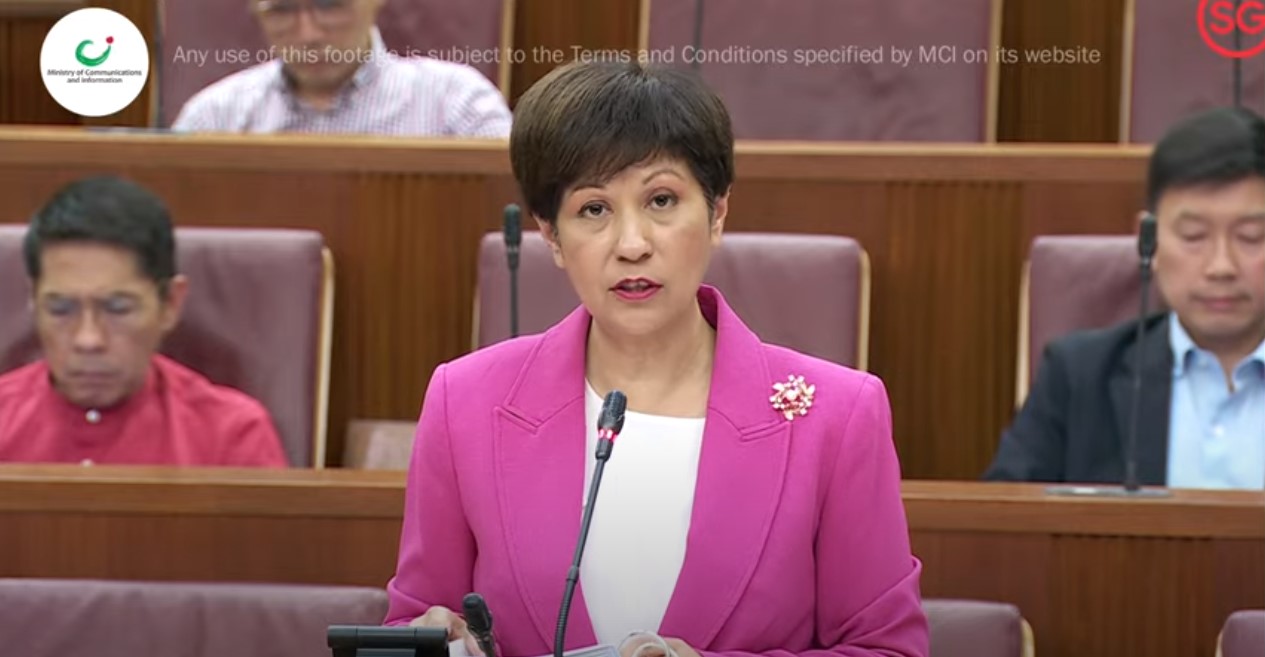Singapore’s Fertility Rate At Historic Low, More Delaying Marriage & Parenthood: Minister
For years, the Government has been trying to get Singaporeans to have more children by dangling ever-higher baby bonuses and support grants.
However, it seems we may not be responding well enough, as Singapore’s fertility rate has continued to plummet.
It’s now at a historic low of 1.05.

This will make sustaining our economic growth more challenging, a minister has said.
Previous low was in 2020
The historic depth of our total fertility rate (TFR) was revealed by Minister in the Prime Minister’s Office Indranee Rajah in Parliament on Friday (24 Feb).
She helps oversee the National Population and Talent Division (NPTD).

Source: MCI Singapore on YouTube
TFR is the average number of live births each woman would have during her reproductive years.
The previous record low was in 2020, when our TFR was 1.1.
Singapore’s TFR has stayed below 1.2 since 2017.
Historic low of fertility rate partly due to Tiger year
Giving reasons for the historically low TFR, Ms Indranee pointed out that most of 2022 was the lunar Year of the Tiger.
This partly contributed to the decrease in births as the Tiger Year is “generally associated with lower births among the Chinese”.
2010, the Tiger year before that, had a TFR of 1.15 — lower than the years before and after it.
More Singaporeans delaying marriage & parenthood
Ms Indranee also cited societal trends for the low TFR.
For example, more Singaporeans are delaying marriage, she said.
More are also postponing having children, or having fewer children, she explained.

Source: tirachardz on Freepik
This isn’t unique to Singapore but is in line with longer-term trends in societies all over the world.
The decrease in our TFR, which has been happening for many years, is thus similar to that of other advanced societies like Norway and Finland.
Even countries like Norway and Finland, which had successfully improved their fertility rates, have found it tough to sustain their increases.
However, she added that at least for Singaporeans,
The aspiration to marry and have children remain strong.
What’s stopping us might be external factors. In 2019, a survey by voluntary welfare organisation I Love Children (ILC) showed that long working hours and stress are the top reasons why Singaporeans have fewer children.
S’poreans Have No Mood To Make Babies Due To Long Work Hours & Stress, Says Survey
More challenging to sustain economic growth
Unfortunately, the work stress may only get worse.
That’s because Ms Indranee thinks that the sliding TFR will make it “increasingly challenging” to sustain Singapore’s economic growth.
This is caused by our resident workforce increasing at a slower rate.

At the same time, Singaporeans are also living longer lives — life expectancy is now more than 83, compared with 72 in 1980.
By 2030, about 25% of Singaporeans will be 65 and older.
Thus, the need for caregiving will also intensify, especially as family sizes shrink, the minister said, adding,
More Singaporeans will face the dual pressures of raising young children while caring for their elderly parents – and in fact, this is already happening.
Welcoming immigrants to Singapore is important: Indranee
In response, the Government is rolling out measures to boost support for parents and families, Ms Indranee said.
However, welcoming immigrants to Singapore is also important, she added.
That’s because they will play a part in moderating the impact of an ageing population and low birth rates.
Acknowledging Singaporeans’ concerns over competition for jobs and resources, among other issues, the minister said a “comprehensive set of factors” are considered when granting citizenship or permanent residency to foreigners.
Have news you must share? Get in touch with us via email at news@mustsharenews.com.
Featured image by MS News.

Drop us your email so you won't miss the latest news.





